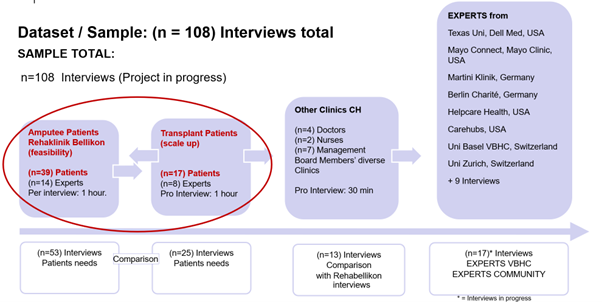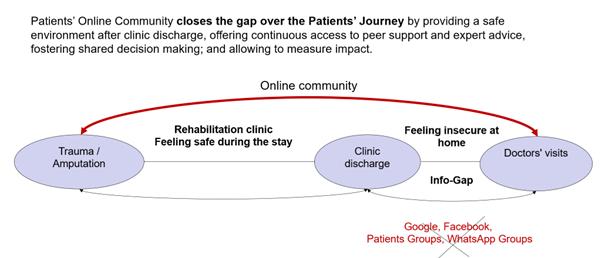Value-Based Patients’ Online Community – a safe environment to get and give peer-support
A qualitative study in collaboration with the Rehaklinik Bellikon, a SUVA clinic, sponsored by Hightech Zentrum Aargau.
This study was conducted by the FHNW School of Business in cooperation with the implementation partner Rehaklinik Bellikon, a specialised SUVA-rehabilitation clinic for patients with complex injuries resulting from accidents.
The study findings will be presented at the 4th e-healthcare CIRCLE congress on June 16, 2023 at Universitätsklinik Balgrist, Zürich.
An online patient community offers substantial advantages to patients affected by specific health conditions. This exploratory study sought to identify the value for patients (value being defined as the health outcome per unit of money spent) and the implications for the social and economic benefits expected of such a community for patients and healthcare experts. The goal of this study is to help platform developers make optimal patient-centered decisions and for researchers to better understand this rapidly growing phenomenon.
The study aims at providing answers to the following questions:
- How is patient’s value perceived by patients and experts?
- How can the community support patients?
- How does the community affect patient’s value?
- How can this value be measured?
This is a qualitative study; the focus group is a group of patients with similar health conditions. In total, we collected 108 individual interviews and one group interview. However, we focus this report on two groups of patients and experts. The first consists of 39 post-treatment patients and another of 14 experts from the clinic specialising in amputation. The second group to interview were 17 transplant patients from different clinics and eight experts in organ transplantation. The focus of the interviews was on what benefits and features the interviewees would expect from a platform for an online patient community.
Patients and experts were largely in agreement that the chief benefits of such a community included the provision of medical information around certain medical conditions and mechanisms of mutual support. The core benefits of the community would be closing the loop of the cycle of care through patient education, unified information stored in one place accessible at any time and the possibility for two-ways communication between patients and experts. This should prevent complications and have a positive impact on patients’ mental health and motivation, as well as foster a shared decision making process. However, regarding complex medical issues cannot, the community cannot substitute for informed expert opinion. The form that the platform should take was also largely the subject of consensus and did not pose substantial technical challenges. However, differences in emphasis arose between the groups' responses on some topics.
The implementation of a platform to support an online patient community poses few technical challenges, but it does require substantial resources, and it may entail complex strategic decisions about its organisation and administration if it is to successfully retain a patient-centered focus. The community impact is beneficial for patients and clinics and can be measured over time.
This study was sponsored by Hightech Zentrum Aargau.


